How to Fix the System Cannot Find the File Specified
Quick fix: Use SFC to fix the system cannot find the file specified error

In Command Prompt, type the following command: sfc /scannow. Now press Enter.
After scanning and correcting errors, restart the computer and check if "the system cannot find the file specified" error is fixed.
"The system cannot find the file specified"
"The system cannot find the file specified" is an error that may happen on Windows 10 or earlier versions and usually indicates an Error Code 0x80070002. The error may also occur under various conditions, but most people receive this prompt when they:
- Access a local hard drive, external hard drive, USB, and more in Disk Management
- Access files and folders on your computer
- Launch a program
- Install Driver
- Back up system

How to Fix "The system cannot find the file specified"
Depending on your situation, the solutions to the problem "The system cannot find the file specified" vary. Identify your situation and find the corresponding solutions below.
| Workable Solutions | Step-by-step Troubleshooting |
|---|---|
| Case 1. Error while accessing the drive | Recover data from the hard drive > fix the hard drive via Diskpart...Full steps |
| Case 2. Error while accessing folders | Check the system log file > look for files via Regedit > check for RTHDCPL in Registry key...Full steps |
| Case 3. Error while launching programs | Update driver > reinstall program > end nginx.exe Process...Full steps |
| Case 4. Error while installing drivers | Look for files via Regedit > check for RTHDCPL in Registry key...Full steps |
| Case 5. Error while backing up system | Install the latest Windows updates > check Services settings...Full steps |
Situation 1. Receive "The system cannot find the file specified" While Accessing a Hard Drive
As you know, most people encounter "the system cannot find the file specified" error when trying to access or back up some data. This is because the file system of the target device is corrupted or damaged, making your hard drive, USB or external hard drive inaccessible. To fix this error, you need to run the chkdsk command to repair the corrupted file system, using reliable data recovery software to bring all lost data back. Then, clean and re-partition the hard drive using the diskpart command in CMD.
First. Run CHKDSK Command to Fix "System Cannot Find File Specified" Device
- Right-click the Start button, type cmd in the Search and select Command Prompt (Admin).
- Type chkdsk x: /f /r (x represents your target drive) into the Command Prompt window and press Enter Wait while chkdsk tries to repair the corrupted file systems.
- Type exit and press Enter to leave this command.
After this, you can try to re-open the drive to find your saved files. If files are missing or not showing up, move to the next tutorial to recover data from your storage device using reliable data recovery software
Next. Recover Data from Problematic Hard Drive or Device
Whether it's an external storage device or local hard drive, you can use Deep Data Recovery to recover data from the device. It is able to retrieve deleted/formatted/lost files and get back data from formatted or inaccessible hard drives. To regain access to your precious files:
Last. Fix the Hard Drive via Disk Clean Diskpart
Now that you have kept your files safe, but the device is still not accessible, you can follow the steps below to fix the device without any worries.
Step 1. Run Command Prompt as an administrator.
Step 2. Enter diskpart and click "Yes" to allow this app to make changes on the computer.
Step 3. Enter the following commands one by one:
- list disk
- select disk 1 (Replace "1" with the number of your problematic disk)
- list disk (Now you will see a star in front of the disk you selected)
- clean (Then you will receive a notification asking you to insert a disk. Click "Cancel". Repeat the "clean" command until you succeed.)
Step 4. If you have successfully cleaned your disk, enter the following commands in order:
- list disk
- select disk X
- create partition primary
- select partition 1
- active
- format fs=fat32 quick ("fs" means the file system you want to assign to the partition, be it FAT32, NTFS, or exFAT. "quick" indicates "quick format".)
If the process goes smoothly, you are now able to access your hard drive or USB drive and use it for data storage again.
Situation 2. Get the Prompt "The system cannot find the file specified" While Accessing Files/Folders
It also happens that you will see the error message when you try to open a folder or file by double-clicking it. There are three solutions to this situation.
Method 1. Check the System Log File
Step 1. Navigate to the C:/Windows/inf directory and open Inf folder.
Step 2. Locate the setupapi.dev or setupapi.dev.log file and open it.
Step 3. Press "Ctrl + F" hotkey and type cannot find the file in the search.
Step 4. Press "Enter" to run the search. You should get the missing file.
Step 5. Copy and paste it into the Windows/inf folder.
Step 6. Reinstall the hard disk driver and reboot the system.
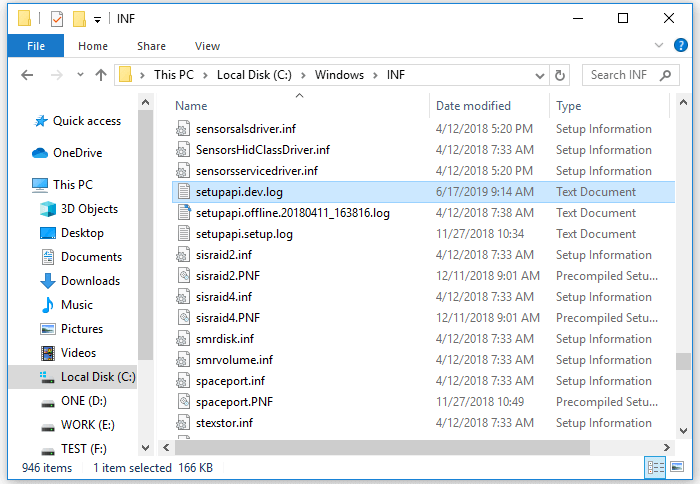
Method 2. Look for Files via Regedit
Step 1. Press "Windows + R" and enter regedit. If there is a prompt asking for permission, click "Yes".
Step 2. Go to HKEY_LOCAL_MACHINE\SOFTWARE\Microsoft\Windows\CurrentVersion and check if there is "RunOnce". If not, add it manually.
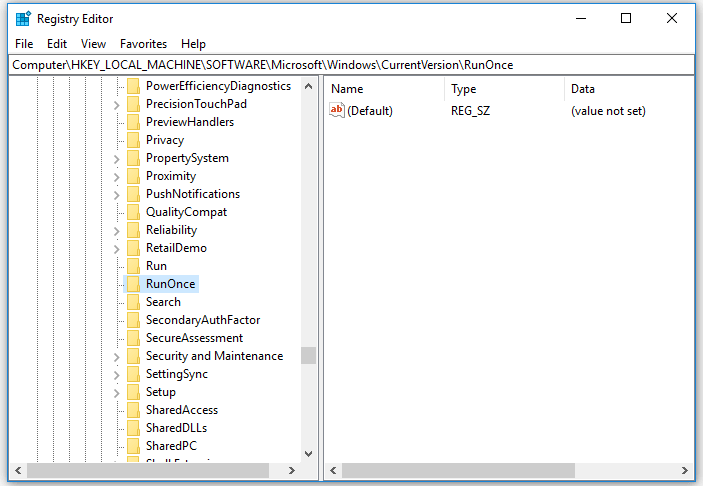
Step 3. Go to HKEY_CURRENT_USER\Software\Microsoft\Windows\CurrentVersion and check whether there is "RunOnce". If not, create it manually.
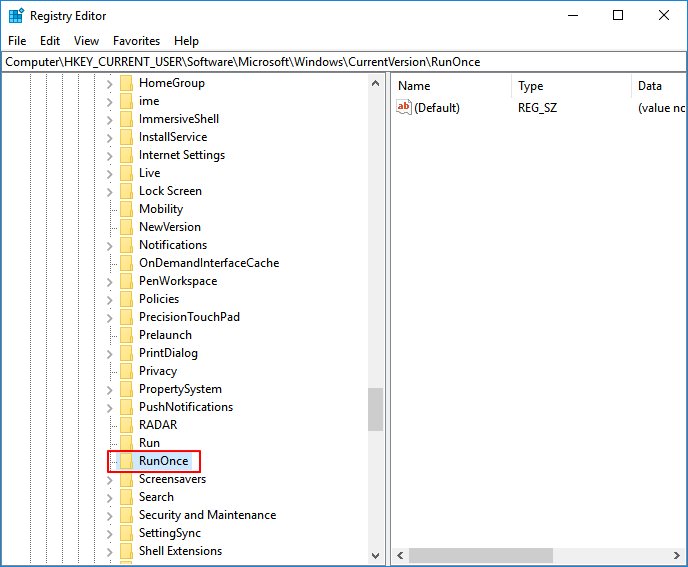
Step 4. Quit Registry Edit, restart your computer and install hard disk drivers again.
Method 3. Check for RTHDCPL in Registry Key
Step 1. Press "Windows + R" and enter regedit. If there is a prompt asking for permission, click "Yes".
Step 2. Go to HKLM\Software\Microsoft\Windows\CurrentVersion\Run\ and look for RTHDCPL. If it doesn't exist, check for "Run" property and set the Admin-user permission as "Full Control", press "OK" to continue.

Be careful not to delete content from your registry since it may result in serious issues on your computer.
Situation 3. See the Prompt Saying "The system cannot find the file specified" While Launching Programs
This one seems to occur frequently among users. Apply one of the three methods below to have a try.
Method 1. Update your hard disk driver
Step 1. Go to "This PC" > "Manage" > "Device Manager".
Step 2. Expand "Disk drives"
Step 3. Right-click the disk and choose "Update driver"
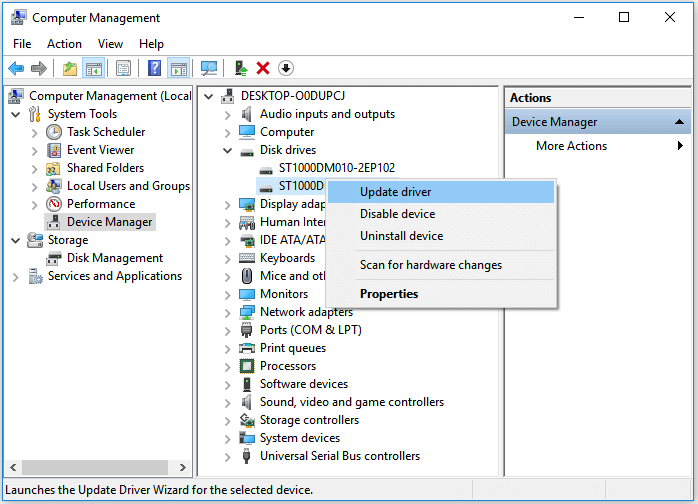
Method 2. Reinstall the Program
Step 1. Quit the program.
- Right-click on your taskbar and choose "Task Manager"
- Under the Processes tab, select the program, and then choose "End Task"
Step 2. Reinstall your program
- Go to "Windows Settings" > "Apps" > "Apps & features"
- Click the problematic program and choose "Uninstall"
- Go to Microsoft Store, download the application, and then install it again.
Step 3. Restart your computer.
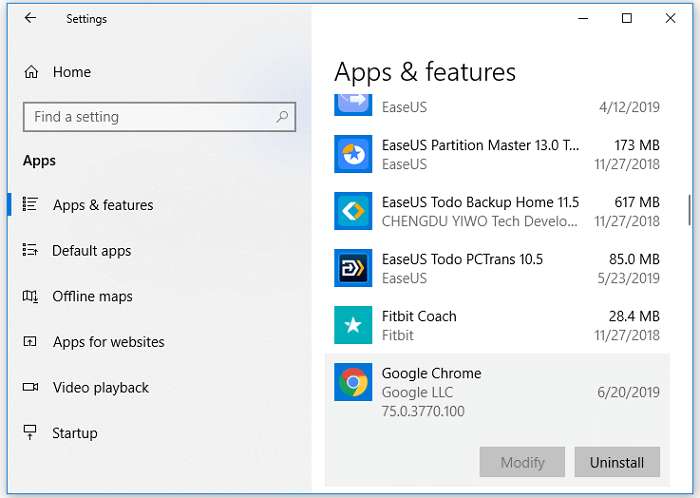
Method 3. End nginx.exe Process
You may feel unfamiliar with nginx.exe, which is an essential Windows process. The notification of "The system cannot find the find specified" error may result from the fact that the Windows OS starts or restart the nginx.exe abnormally. To fix it:
Step 1. Right-click on your taskbar and choose "Task Manager".
Step 2. Under the Processes tab, select nginx.exe, and then choose "End Task"
Step 3. Download nginx.exe again and restart it.
Situation 4. Receive "The system cannot find the file specified" While Installing Drivers
If you receive the notification while installing a driver on your PC, you can try method 2 or method 3 in Situation 2 to get rid of the "The system cannot find the file specified" error.
Situation 5. Get the Error Message "The system cannot find the file specified" While Backing Up System
If your condition fits this situation, you have several options to try. In addition to trying method 3 in Situation 3, you can also try the two tips detailed below.
Method 1. Install Windows updates
If you haven't updated Windows for a long time, "The system cannot find the file specified" error is a sign that it's about time to install all pending updates. For this purpose, you have to:
Step 1. Press "Windows + I" keys and select Update & Security.
Step 2. Click "Check for Updates" and wait.
Step 3. When the list of available updates is revealed, install all of them.
Step 4. Repeat the same procedure several times to ensure that all needed updates have been installed.
Step 5. Don't forget to restart the system to finish the installation of updates.
If you find files are missing after Windows update, you can restore the files with the help of Qiling's data recovery freeware. This free tool allows you to recover lost files in Windows 10, 8 or 7, etc., due to the system upgrade, system crash, careless deleting or virus attacking within three simple steps.
Method 2. Check Services Settings
Step 1. Go to the Start menu and type services.
Step 2. Go to "Background Intelligent Transfer Services", right-click it and set the "Startup type" to "Automatic" or "Automatic (Delayed Start)", then click "Start".
Step 3. Go back to find "Cryptographic Services" and "Windows Update", then set their "Startup type" to "Automatic", too.
Step 4. Don't forget to click "Start" to initiate the service and click "Apply" > "OK".

The Bottom Line
Since the error message "The system cannot find the file specified" may appear in many situations, it's almost impossible to include all the solutions in one article. Thus, we have presented you with four commonest situations and the most effective fixes for them. Hope one of the tips above can fix "The system cannot find the file specified" for you successfully.
Related Articles
- Fix macOS Sierra 10.12.1 Update Stuck or Fail to Download Error
- How to Fix Windows Update Freezes Computer with 7 Solutions
- Short DST Failed! How to Fix Hard Disk DST Short Test Failed
- 5 Ways to Fix Hard Drive Read Speed Slow Error